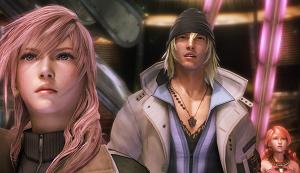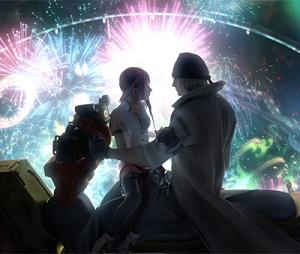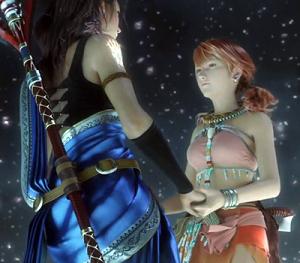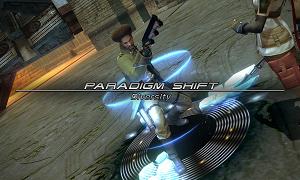Solo Gamer Review: Final Fantasy XIII
Solo Gamer Reviews are dedicated to the gamer who does not play well with others, doesn't care about multiplayer modes in his or her games, and who absolutely despises things like multiplayer achievement points. These are reviews for guys and gals who prefer to play with themselves, and thus games will be penalized if developers spend more time on slayer deathmatch options than on the single-player experience. We solo gamers prefer a well-thought-out story, an immersive universe, and hours upon hours of enjoyment without having to shoot an endless horde of twelve-year-old punks in the head over the Internet. So throw away your WiiSpeak and your X-Box Live headset, and all hail the solo gamer!
The game is almost a year old already, and I told myself I wasn't going to write a full review. However, several people have been asking me my opinion of the latest installment in the Final Fantasy series, the ever-controversial Final Fantasy XIII, and I am unapologetically geeky enough to share it here.
Final Fantasy XIII (hereinafter just XIII) shouldn't be any more controversial than any other Final Fantasy game because Square Enix stubbornly refuses to release the same game twice. While there is plenty of connective tissue between each game and certain common elements that can be found in most of them, no two games in the series are alike. For this reason, some fans refuse to believe that anything released after their favorite entry can be as good as the one before it, which means that, as the series progresses, each one will inspire more and more fanboy criticism and thus more apparent controversy.
This is why many fans talk about how the series has never recovered from the transition to 3D in VII or from the loss of Hironobu Sakaguchi following the release of IX. Indeed, it seems you can loosely delineate between three periods in the history of Final Fantasy: the sprite-based era of I through VI, the PS1 era of VII through IX, and the modern, post-Sakaguchi era of X through today. Most die-hard fans will defend their favorite era with zeal, and truth be told, there are plenty of pros and cons for each.
Still, despite the constantly changing nature of the series, I refuse to believe that the best game is behind us, even though it may be true, because that automatically taints my opinion of games that haven't even been released yet. With that in mind, I tried to approach XIII with as little bias as possible. I'd heard plenty of things both positive and negative before going into it, but I knew the only way to truly get a feel for this particular game was to play it myself.
STORY
 | | As you should expect, most of the characters have long hair and dress like they are unfamiliar with clothing. |
***WARNING: This review does contain spoilers, but as the game has been out a year now, I don't feel guilty about that. I will warn you before the big ones, but there are some minor ones that will just slip out.***
At first, it seems as though XIII follows the same basic story formula of nearly every game in the series: a group of oddly-monikered misfits must band together and rebel against an overpowering government and a tyrannical übervillain. While this sort-of pans out by the end, the narrative is far more complex than that. For one thing, these characters really don't like each other at first, and for good reasons. Early in the story, for example, one character, the brash Snow, is indirectly responsible for the death of one of the other characters' mother. The motherless Hope, then, is initially motivated to work with the group just long enough to take his vengeance on Snow.
Indeed, it is the strength of the characters that carries XIII. Each character is given multiple nuances and dimensions and a fully-realized backstory. Much of the storytelling is reminiscent of Lost in that it concentrates on a single character at a time and illuminates him or her through a series of interconnected flashbacks. There are mysteries and surprises that keep coming until the very end, and that's refreshing from a series that often contains dry, one-dimensional protagonists. On the other hand, the game's antagonists aren't as fully realized or interesting. The ultimate villain--I won't spoil who it is here--isn't nearly as memorable as Sephiroth or Kefka.
 | | There's also a love story, but not a terribly happy one |
Another thing that makes the story notable is its utter bleakness. While every Final Fantasy has ridiculously high stakes, no game has succeeded in making it seem as though the characters are completely doomed from the get-go as XIII has. These heroes are not just underdogs; they're feared, hated, and hunted by literally everyone, they've been forced to make an impossible choice they don't fully understand that will either kill them or turn them into monsters, and they have no idea what to do about any of it. When some of the characters decide that the only logical choice is to run away and hide, you actually believe they are being perfectly reasonable given the circumstances. One of the characters even comes close to suicide in order to prevent the destruction of mankind, and really, given the alternatives, it's not such a bad idea.
There is also a shade or two of actual relevance. Final Fantasy has never been known for offering insightful social commentary, but it is hard to deny the analogies to be made between the society of Cocoon (where the majority of XIII takes place) and the modern West. Cocoon lives in decadence, but also in constant fear of another place called Pulse (or Gran Pulse, depending on who you ask), as the result of an attack that took place in which it is said that Pulse terrorists tried to destroy Cocoon. Now, the people of Cocoon are so afraid of Pulse terrorism striking again that they are willing to purge an entire town just because its people may have come into contact with an agent of Pulse. This is obviously an extreme analogy, but its provocative nonetheless.
There are a few things about the story that are annoying, however. For one thing, the characters are all too aware that they're being set up every step of the way, but they continue to move forward without second-guessing their actions. On top of that, when it is revealed that one of the characters knows a hell of a lot more than he or she has let on, you'd think the rest of the group would press for answers or, at the very least, we'd get a cutscene explaining some things. However, that character remains strangely quiet about what he or she knows (information that is pretty crucial to the endgame, I might add), and the other characters don't seem to mind. This is infuriating storytelling, and is also kind-of reminiscent of Lost.
 | | This is just plain wrong |
My other big problem with the story is best exemplified by the climax. Needless to say, this paragraph contains major spoilers, so if you don't want to be spoiled, skip ahead. The climax of the story involves the characters barging into the chamber of a being known as Orphan. Up to this point, the villain, Barthandelus, has made it perfectly clear that he wants the heroes to destroy Orphan (which will effectively wipe out humanity) and has manipulated events to make it happen. In other words, just charging into Orphan's chamber should raise some alarm bells in our heroes, but it doesn't, even after Barthandelus dramatically illustrates that he can create whatever illusions he wants. Then, oddly, the heroes actually start fighting Orphan, who it turns out is the same as Barthandelus in a perfectly weird Japanime twist. What's confusing is not only that the heroes are doing exactly what the big villain wants, but also that Barthandelus/Orphan is fighting back, all while trying to trick them into killing him, something they are actively trying to do. Granted, the ending is awesome, but none of the climax leading to it makes sense to me. This is similar to earlier in the game, too, when the heroes fight Cid, because Cid wants to stop them from destroying Cocoon, which is what the heroes want too, and yet they have to fight. I know somebody is inevitably going to tell me that my misunderstanding comes from a lack of knowledge about Japanese culture, but unless Japanese people fight to the death every time they realize they agree with each other, I'm not convinced.
It also wouldn't be a Japanese RPG without some uncomfortable sexual tension involving a too-young female character. Vanille, who is lovingly rendered as a half-wild Japanese schoolgirl in a skirt, shares odd moments of sexual tension with multiple characters including Fang, another female. Granted, while she is revealed to actually be several centuries old, she behaves and looks exactly like a fifteen-year-old, at best. That's inappropriate and offensive, but it's also par for the course in Japanese RPGs these days.
|
[Story: 8 - The characters are, bar-none, the most fleshed-out in all of Final Fantasy, but the narrative does fall into some typical JRPG traps and has its fair share of needlessly confusing plot points]
|
|
GAMEPLAY
 | | Yes, it's a terrible pun |
In the post-Sakaguchi era, it seems as though the trend has been toward faster-paced combat and less micromanagement of each and every turn in battle. XII introduced the gambit system, which involved the use of macro-like gambits that defined how your party members would behave in battle. XIII takes it a step further with the paradigm system, which automatically assigns certain roles (what are called "jobs" in earlier games) to each character and allows you to change them on the fly, right in the middle of fighting. You could have a paradigm in which one hero hammers away at the baddies, another casts status-effect spells on them, and the last is doing everything he or she can do to keep the party healed and healthy. This works incredibly well because the A.I. is astonishingly accurate; given their respective roles, each character knows exactly what to do in any given situation.
It takes some time getting used to giving up control over when "Esuna" is cast or which status effect is the first cast on your enemies, et cetera, but I can't stress enough how good the A.I. is at deciding these things. Rarely will you ever feel like you would make a different choice. For example, if you scan an enemy using the "libra" technique (more on techniques in a moment), everybody in your party will know from that moment on what that enemy's strengths and weaknesses are and act accordingly. Therefore, you no longer have to try to memorize the weaknesses of every enemy in the game, nor do you have to memorize which spells create which status ailments and so on. Over time, the paradigm system goes from feeling restrictive to feeling downright liberating.
This is because, by taking so much micromanagement out of the player's hands, it frees you up to focus on the bigger swings of the battle. Since the battles move incredibly quickly, you start to feel like you're choreographing an intense fight scene. You have to make choices very quickly that will make or break the battle, and it ultimately feels more intense and organic than any Final Fantasy battle system to date. This is not to say that the entire battle is just switching paradigms, because you also have techniques the party leader can use to, for example, scan an enemy or use a summon. The leader can also use items like potions, antidotes, and the always valuable elixirs. If you really want, you can even dictate each action of the party leader, but you almost never have that kind of time to waste, especially later in the game.
-e. magill 2/15/2011
|
|